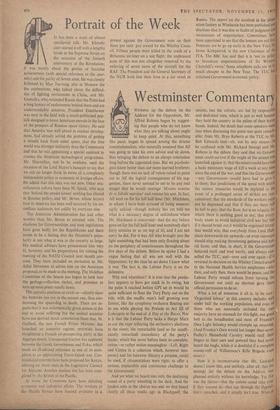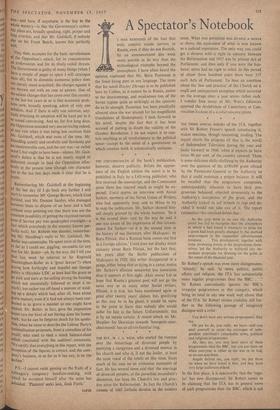Westminster Commentar
WINDING up the debate on the Address for the Opposition, Mr. Alfred Robens began by suggest- ing that people who do not know what they are talking about ought to keep quiet. At this, something like panic began to spread among the Stricter constitutionalists, who naturally assumed that Alf was going to take his own advice and sit down, thus bringing the debate to an abrupt conclusion long before the appointed time. But we psycholo- gists know better than our more learned brethren; though there was no lack of voices raised to point out to Alf the logical consequences of his sug- gestion, there never seemed to me to be any real danger that he would murnuir 'Mutat° 'tontine de te tabula narratur' and resume his seat. In fact, Alf went on for his full half-hour (Mr. Mitchison, to whom I have- been accused of being unneces- sarily unkind—though nobody has yet told me what is a necessary degree of unkindness where Mr. Mitchison is concerned—had the day before gone on for his full half-hour and somebody else's forty minutes or so on top of it), and I am not sorry he did. For it was Alf who brought into the light something that had been only floating about on the periphery of consciousness throughout the five days of the debate. Before he spoke I had a vague feeling that all was not well with the Opposition; by the time he sat down I knew what it was. The fact is, the Labour Party is on the defensive.
Why and wherefore? It is true that the pendu- lum appears to have got stuck in its swing, but the point it reached before GPI set in would be quite sufficient to float the Tory Party out on the tide, with the muffin man's bell growing ever fainter, like the symphony orchestra floating out to sea while playing the Prelude to Act III of Lohengrin at the end of A Day at the Races. Nor is it that the Labour Party lacks a Harpo Marx to cut the rope tethering the orchestra's platform to the shore; the remarkable (and so far insuffi- ciently remarked) ascendancy of the party's leader, which has never before been so complete, unites—or rather makes meaningless—Left, Right and Centre in a cohesion which, however tem- porary and for however illusory a purpose, could be used, if circumstances Were right, to offer a serious, implacable and continuous challenge to the Government.
And yet what we heard was only the deafening sound of a party whistling in the dark. And the loudest note in the chorus was one we first heard clearly all those weeks ago in Blackpool; the unions, ran the refrain, are led by responsible and dedicated men, which is just as well because they hold the country in the palms of their hornY hands. Indeed, the detail that some speakers went into when discussing this point was quite remark- able; from Mr. Bryn Roberts at the TUC to Mr. Bob 'Edwards (not—oh, not by any means—t° be confused with Mr. Richard Strong) and Mr. Robens in the debate they said that no Govern- ment could survive if the might of the unions was launched against it; that the miners could have had a basic minimum wage of £20 a week at any t ine since the end of the war, and that the Government —any Government—would have had to give it to them; that predictions of the speed with which the unions' treasuries would be depleted in the event of a prolonged series of strikes are mis- conceived; that the standards of the workers muss not be depressed and that if they are there v,i11 be hell to pay; that the Rent Act is an iniquity for which there is nothing good to say; that C1 L body wants to avoid industrial civil war but that if it should break out it would be organised la bone that would win; that everybody from Lord Flail' sham downwards (or upwards—or even sideways) should stop making threatening gestures and hor- rid faces; and that, in short, if the Government behaved itself and trod warily, and always con stilted the TUC, and—over and over again—if it reversed its decision on the Whitley Council award to the National Health Service employees—whY then, and only then, there would be peace, and the Labour Party would refrain from turning the Government out until an election gave tiler(' official permission to do so.
What a lot of nonsense it all is, to 'be sure! `Organised labour' .in this country includes well under half the working population, and even of those who are nominally included the vast majority have no stomach for this fight; one gcod belt in the breadbasket and most of Frank C.5 Own Light Infantry would crumple up, moaning. (And Frankie's Own would last longer than some; Padley's Household Cavalry would stuff their fingers in their ears and pretend they had never heard the bugle, while it is doubtful if a complete muster-roll of Williamson's Rifle Brigade even exists.) Now it is inconceivable that Mr. Gaitsli ell doesn't know this, and unlikely, after all, that the strategy Lor the debate on the Address veds planned entirely without his knowledge. Yet this was the theme—that the unions could take over if they wanted to—that ran through the Opposi- tion's speeches; and it simply isn't true. What is
oto° true—and here, if anywhere, is the key to the
and whole mystery—is that the Government's econo-
mic plans are, broadly speaking, right, proper and Lave long overdue, and that Mr. Gaitskell, if nobody
ost' else on his Front Bench, knows this perfectly Sit wen.
This, then, accounts for the basic nervelessness of the n
,apposition's attack, for its concentration
O n irrelevancies and for its thinly-veiled threats. The Government is guilty of many things (when I have a couple of pages to spare I will catalogue them all), but its domestic economic policy does not merely stand acquitted; the charges against it are thrown out with no case to answer. One of
the salient changes that has come over this country in the last ten years or so is that economic prob- lems now broadly speaking, admit of only one °lotion. And if there is only one solution, any- body attacking its adoption will be hard put to it to sound convincing. And so, for five long days, the OPposition sounded very unconvincing indeed, at any rate when it was being less cautious than Mr. Gaitskell, which was most of the time. Mr. Maudling quietly and carefully and flawlessly put an unanswerable case, and the rest was—or rather wasn't, but ought to have been—silence. Mr. Gait- skell's defect is that he is not nearly stupid or dishonest enough to lead the Opposition effec- tively at the present time (though one character has in the last few days made it clear that he is both). • Remembering Mr. Gaitskell at the beginning of the last day (if I go back any farther I will start to remember Mr. George Brown, which God krfend, and Mr. Duncan Sandys, who managed between 'them to dispose of an hour and a half Without once pointing out that there was not the remotest possibility of getting the required recruits even if Service pay was quadrupled overnight—a fact which everybody in the country knows per- fectly well), Mr. Robens was disaster; remember- ing Mr. Maudling's reply to Mr. Gaitskell, Mr. Butler was catastrophe. He spent most of the time, as far as I could see, giggling; excusable (at any rate for Mr. Butler—oh, by the way, did I tell you that last week he referred to Sir Reginald Manningham-Buller as a 'great lawyer'?) when saying how forthright and hopeful our foreign Policy is (Hoylake UDC at least had the grace to CO pink and stare at the ceiling during the hooting Which not unnaturally followed so inept a re- mark), but rather too off-hand a manner of wind- ing up a debate which had, after all, been about grave matters, even if it had not always been con- ducted in as grave a manner as one might have Wished. Mr. Butler, in fact, gave the impression (most rare for him) of not having done his home- Work; but he can be forgiven Much for his quota- tion, when he came to describe the Labour Party's nationalisation proposals, from a comedian of his Youth, who used to read a mock balance-sheet Which concluded with the auditors' comments, We certify that everygling in this report, with the exception of the figures; is correct, and the com- l3anY's business, in so far as it has any, is on the incline.'
P.S.—I cannot resist passing on the fruits of a' "lleague's imaginary headline-making, with Which he occupied himself after the noise has 6obsided: Plummer seeks leak, finds Poole.'
TAPER



































 Previous page
Previous page